As US Threatens to “Take a Pass” on Peace Talks, Russia Ends Energy Truce While Kharkiv Bleeds and POW Exchange Materializes
Summary of the Day – April 18, 2025
Russia’s missiles struck Kharkiv on Good Friday, killing one and wounding 112, as the Kremlin announced the expiration of its repeatedly violated energy infrastructure ceasefire. President Trump delivered his starkest ultimatum, threatening to walk away from peace negotiations unless progress emerges within days. “You’re foolish, you’re fools, you’re horrible people,” he said of those blocking a deal, while Secretary Rubio described Ukraine’s war as “terrible, but not our war.” Meanwhile, Ukraine repatriated the bodies of 909 fallen defenders, and preparations advanced for a major prisoner exchange of nearly 500 captives scheduled for April 19.
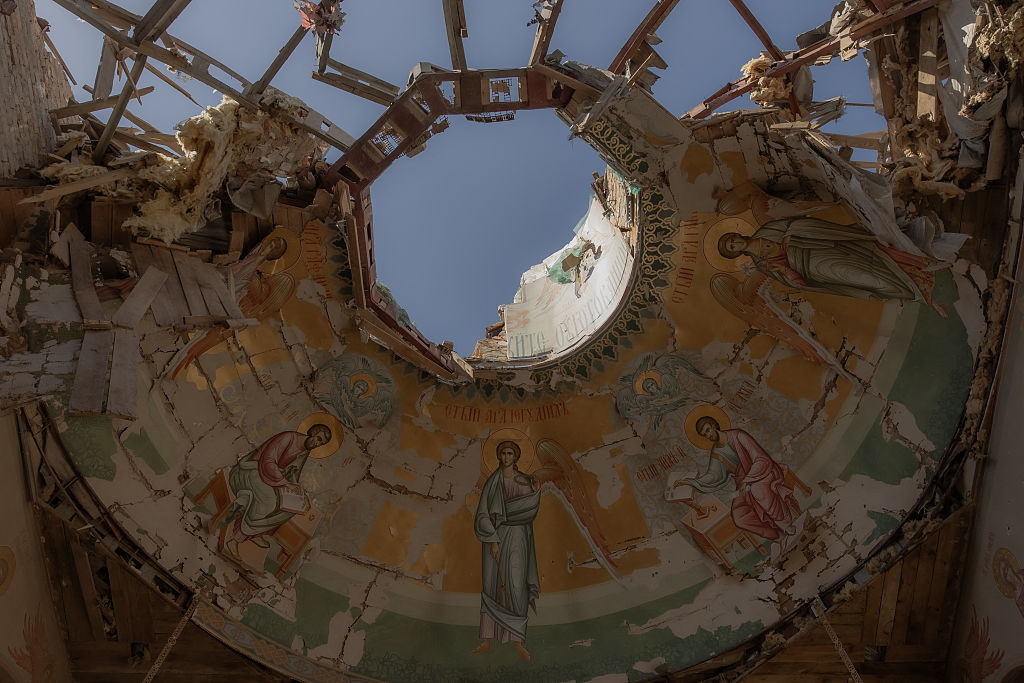
This photograph shows the interior of a church heavily damaged by shelling in Kostyantynivka, eastern Donetsk region, amid the Russian invasion of Ukraine. (Roman Pilipey / AFP via Getty Images)
“You’re Fools”: Trump Issues Ultimatum on Peace Negotiations
President Donald Trump delivered his most explicit threat yet to abandon mediation efforts between Ukraine and Russia, telling reporters in the Oval Office that Washington would “take a pass” if either side makes a peace deal too difficult to achieve.
“If for some reason one of the two parties makes it very difficult, we’re just going to say: ‘you’re foolish, you’re fools, you’re horrible people,’ and we’re just going to take a pass,” Trump declared, though he added, “hopefully we won’t have to do that.”
The statement reinforced earlier remarks from Secretary of State Marco Rubio, who warned after meetings with European and Ukrainian officials in Paris that the administration is prepared to walk away from peace efforts within “days, not weeks” if substantial progress isn’t made.
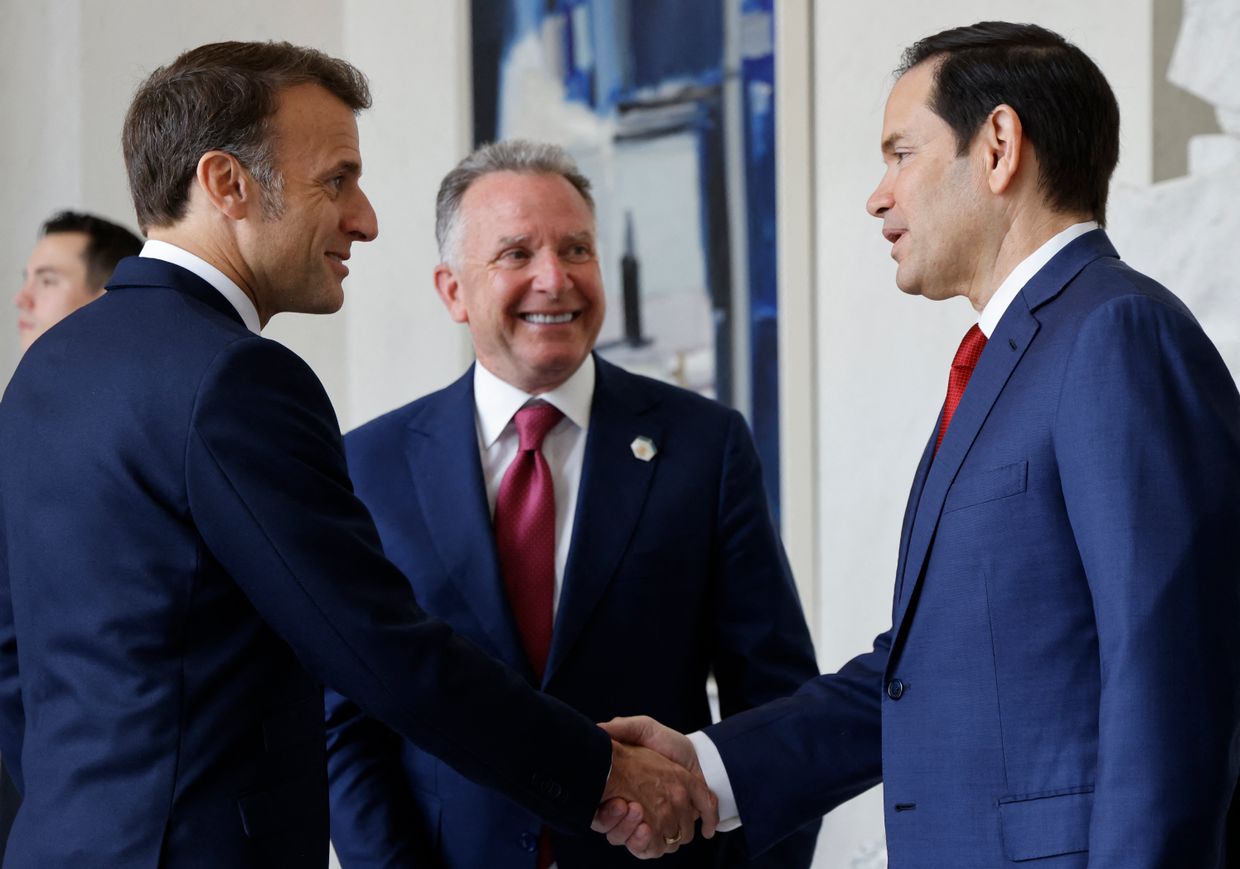
France’s President Emmanuel Macron (L) shakes hands with U.S. Secretary of State Marco Rubio (R) next to U.S. Special Envoy Steve Witkoff before a meeting in Paris. (Ludovic Marin / AFP via Getty Images)
“We’re not going to continue with this endeavor for weeks and months on end,” Rubio said. “We spent three years, billions of dollars supporting the Ukrainian side… but now we’ve reached the point where we have other things we have to focus on.”
In a comment certain to alarm Ukrainian officials, Rubio added: “I think it’s important to remind everybody that the Ukraine war is a terrible thing, but it’s not our war. We didn’t start it.”
CNN reported that Rubio’s comments directly reflected Trump’s views, indicating a coordinated message from the administration.
Kharkiv Bleeding: Russian Missile Strike Kills One, Injures 112 on Good Friday
A Russian missile attack on Kharkiv left a devastating toll on April 18, killing one civilian and wounding 112 others, including eight children. The attack came as Ukrainians prepared to observe Orthodox Good Friday, one of the holiest days in the calendar.
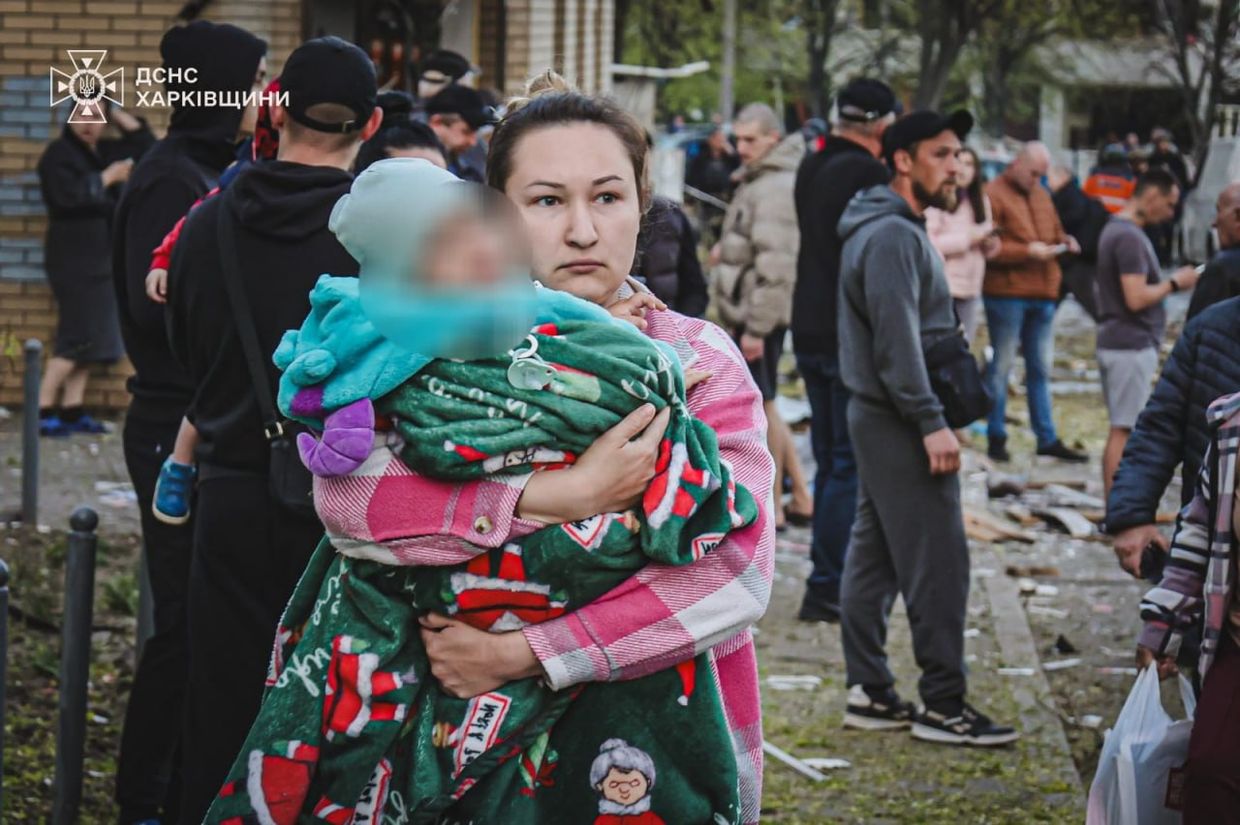
The aftermath of a Russian missile attack on Kharkiv, Ukraine. (State Emergency Service/Telegram)
“According to preliminary information, the strikes on Kharkiv were carried out with ballistic missiles equipped with cluster munitions. That is why the affected areas are so extensive,” Mayor Ihor Terekhov reported, explaining the high casualty count.
The bombardment damaged at least 20 apartment buildings, 30 houses, and an educational institution. First responders battled a fire that covered an area of 450 square meters at an industrial facility.
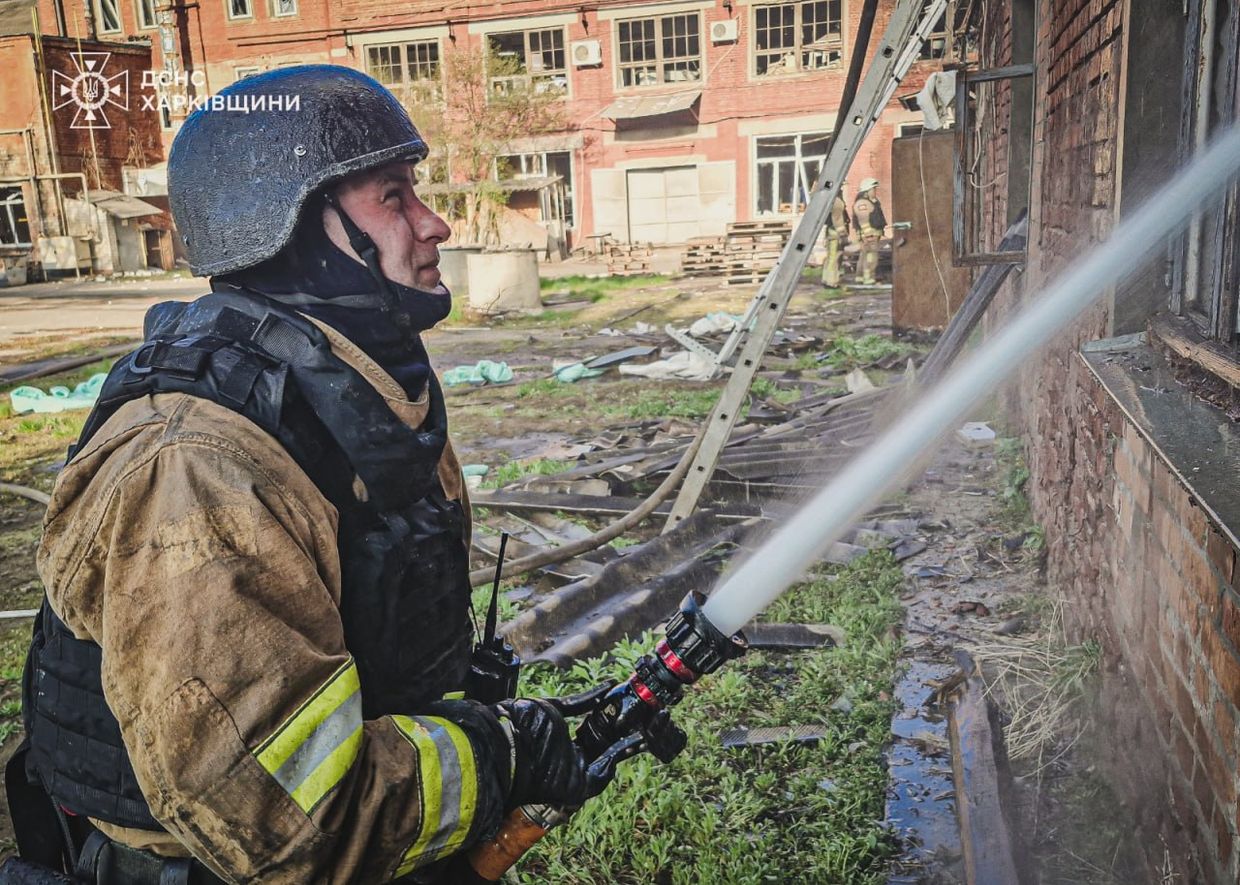
The aftermath of a Russian missile attack on Kharkiv, Ukraine. (State Emergency Service/Telegram)
Ukrainian President Volodymyr Zelensky condemned the timing of the attack: “This is how Russia started Good Friday—with ballistic missiles, cruise missiles, Shahed drones. A mockery of our people and cities.”
The strike came just hours after the Kremlin announced the expiration of the partial ceasefire on energy infrastructure, signaling Russia’s escalation as peace talks falter.
Ceasefire Expired: Russia Announces End to Energy Infrastructure Truce
Kremlin spokesman Dmitry Peskov announced that the one-month moratorium on strikes against Ukrainian energy infrastructure had expired on April 18.
“The one-month period has indeed expired,” Peskov told reporters. “At the moment, there have been no other instructions from the Supreme Commander-in-Chief, President of Russia Vladimir Putin.”
While claiming there had been “progress” in peace talks, Peskov did not elaborate on whether Moscow would resume attacks on energy facilities or extend the ban. Russia’s missiles raining down on Kharkiv the same day suggested the answer.
The partial truce, originally discussed on February 18 and formally agreed to following US-mediated talks in Riyadh on March 25, had been violated by Russia more than 30 times, according to Ukrainian Foreign Ministry Spokesperson Heorhii Tykhyi.
Sumy in Darkness: Blackouts Hit Region After Russian Strikes
Blackouts were reported across Sumy Oblast on the evening of April 18 following Russian strikes near Konotop and surrounding settlements, occurring just hours after the Kremlin announced the end of its energy infrastructure ceasefire.
According to Ukrainian media outlet Suspilne, explosions were heard near the city of Konotop around 8:00 p.m. local time. While Konotop Mayor Artem Semenikhin reported no casualties or injuries, settlements throughout Sumy Oblast, including Krolevets and Shostka, lost power after the strikes. Local residents also reported that water supplies had been cut off.
Energy officials confirmed on Telegram that the blackouts were a direct result of Russian strikes on critical infrastructure. The timing—immediately following Kremlin spokesman Dmitry Peskov’s announcement that the energy truce had expired—suggests Russia had already planned to resume its campaign against Ukraine’s power grid.
The attacks against Sumy Oblast, coming during Orthodox Holy Week, indicate that Russia has abandoned any pretense of extending the partial ceasefire and has deliberately resumed its strategy of targeting civilian infrastructure as winter gives way to spring.
Diplomatic Bombshell: US Proposal Would Leave Occupied Ukrainian Territories Under Russian Control
US proposals for ending Russia’s war would leave occupied Ukrainian territories under Russian control and ease sanctions against Moscow, Bloomberg reported, citing unnamed European officials familiar with discussions held in Paris on April 17.
The plan, outlined during meetings between American, European, and Ukrainian officials, aims to secure a full ceasefire “within weeks” while effectively freezing the current battle lines. The proposal would also take Ukraine’s NATO aspirations off the table, according to Bloomberg’s sources.
US officials reportedly stressed that the plan requires further discussion with Kyiv and would not constitute a final settlement. European allies would not be expected to recognize the occupied territories as Russian under the proposal.
The Bloomberg report followed earlier comments from US Special Envoy Steve Witkoff, who has suggested that peace negotiations center on the status of “five territories”—understood to mean Crimea, Donetsk, Luhansk, Zaporizhzhia, and Kherson oblasts.
President Zelensky has repeatedly said Ukraine would never recognize Russian control over its sovereign territory as part of any peace agreement.
American Concession Emerges: US Ready to Recognize Russian Control of Crimea
The United States is prepared to recognize Russia’s control over Crimea as part of a broader peace agreement between Moscow and Kyiv, Bloomberg reported on April 18, citing people familiar with the matter.
This potential concession, which would represent a significant diplomatic win for Russian President Vladimir Putin, signals President Donald Trump’s determination to secure a ceasefire deal at almost any cost. The revelation came on the same day Trump and Secretary of State Marco Rubio indicated the administration might abandon its peace-brokering efforts if negotiations fail to progress soon.
Russia invaded and illegally annexed Crimea in 2014, with Russian troops without military insignia seizing key infrastructure across the peninsula before a widely condemned sham referendum claimed 97 percent of voters favored joining Russia. The international community, including previous U.S. administrations, has consistently refused to recognize Russia’s sovereignty over the territory.
According to Bloomberg’s sources, no final decision has been made, and a U.S. official familiar with the negotiations declined to comment, citing the sensitivity of the ongoing talks.
President Zelensky has repeatedly stated that Ukraine will not cede any part of its territory to Russia, including Crimea. So far, Putin has rejected Trump’s broader peace proposal, suggesting the possible Crimea concession may not be enough to satisfy Moscow’s maximalist demands.
“Optimistic” Despite Stalemate: Vice President Vance Sees Hope for Peace
The United States remains hopeful that Russia’s full-scale war against Ukraine can be brought to an end, U.S. Vice President JD Vance said during a visit to Italy on April 18, striking a more positive tone than other administration officials.
“I want to update the prime minister (Giorgia Meloni) on some of the negotiations between Russia and Ukraine… even in the past 24 hours, we think we have some interesting things to report on,” Vance told reporters, without providing details.
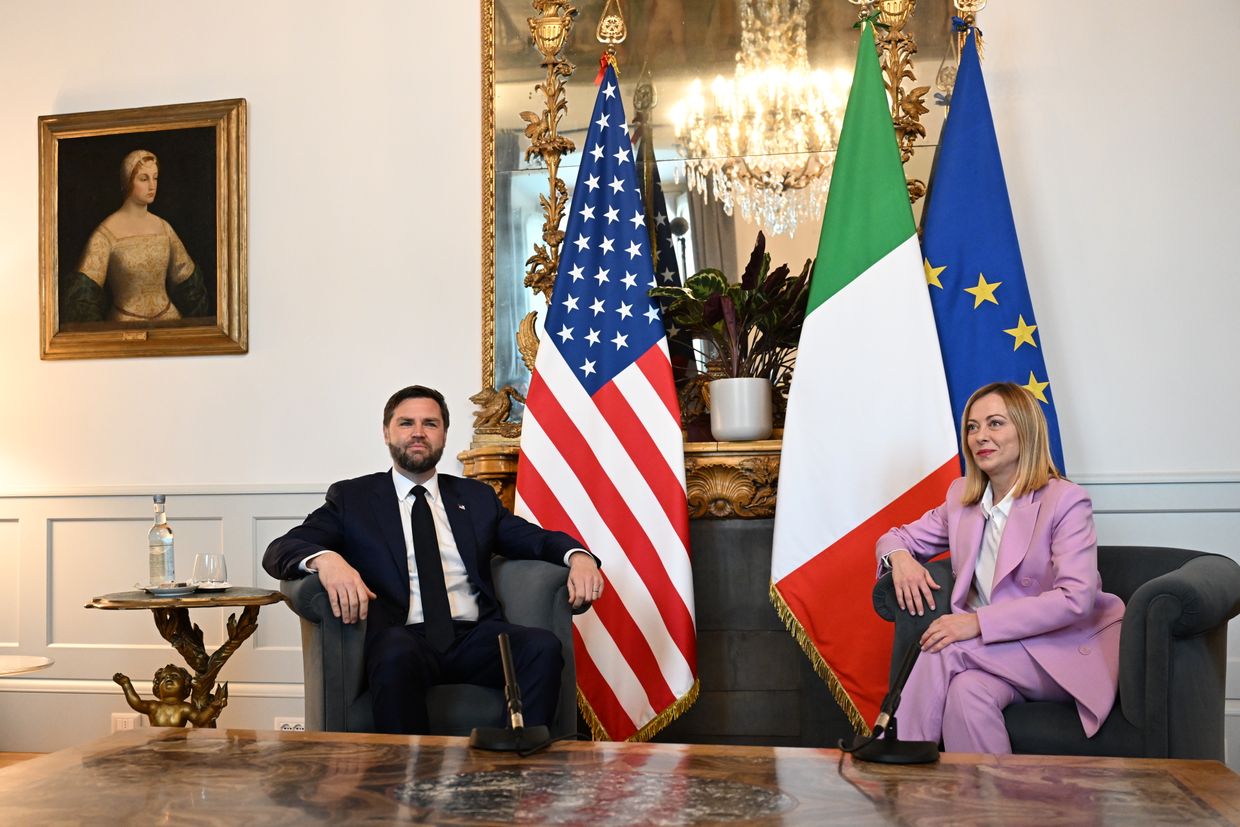
U.S. Vice President JD Vance meets with Italian Prime Minister Giorgia Meloni at Chigi Palace, in Rome, Italy. (Kenny Holston / Getty Images)
“Since there are the negotiations, I won’t prejudge them, but we do feel optimistic that we can hopefully bring this war, this very brutal war, to a close,” he added.
Vance’s comments came just hours after Secretary of State Marco Rubio and President Trump threatened to abandon peace negotiations if substantial progress isn’t made within days, highlighting apparent divisions within the administration over the approach to Ukraine.
Bringing the Fallen Home: Ukraine Repatriates Bodies of 909 Soldiers
In a somber reminder of the war’s continuing human toll, Ukraine announced the repatriation of the bodies of 909 soldiers killed in combat with Russian forces.
Ukraine’s Coordination Headquarters for the Treatment of POWs said the bodies included service members who fell in the Kurakhove, Pokrovsk, Bakhmut, Vuhledar, Luhansk, Zaporizhzhia, Sumy, and Kharkiv sectors, as well as those held in Russian morgues.
“We express our gratitude for the assistance of the International Committee of the Red Cross,” the announcement stated, acknowledging the organization’s role in facilitating the transfer.
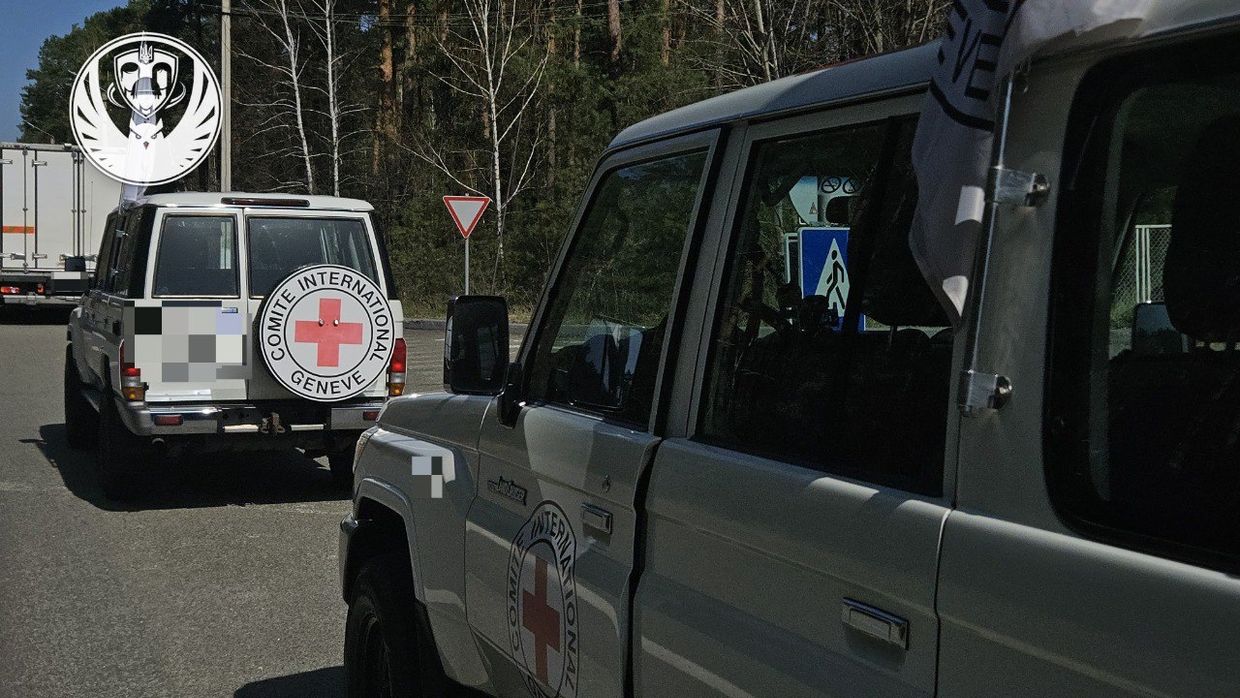
Vehicles of the International Committee of the Red Cross in an unspecified location in Ukraine. Photo published. (Ukraine’s Coordination Headquarters for the Treatment of POWs/Telegram)
The Geneva Conventions stipulate that those who perish during war are entitled to a dignified burial, though Russia has frequently delayed or obstructed the return of Ukrainian remains.
President Zelensky revealed in February that over 45,000 Ukrainian soldiers have been killed since the start of Russia’s full-scale invasion in 2022.
Light on the Horizon: Major POW Exchange Set for April 19
Even as diplomatic relations grew more strained, plans emerged for what could be one of the largest prisoner exchanges of the war. According to Sky News, Ukraine and Russia are preparing to swap 246 POWs from each side on April 19, along with 46 injured soldiers.
The United Arab Emirates will mediate the exchange, continuing its role as a neutral facilitator for such humanitarian agreements.
If completed as reported, this would bring the total number of Ukrainian POWs returned from Russian captivity to over 4,500 since the full-scale war began. The most recent previous exchange took place on March 19, when 175 Ukrainians were brought home.
Ukraine’s ombudsman Dmytro Lubinets has stated that Russia still holds over 16,000 Ukrainian civilians in captivity. The total number of Ukrainian military prisoners remains undisclosed.
Ukraine has previously proposed an all-for-all prisoner exchange, but Russia has not agreed to the comprehensive proposal.
Japanese Aid Package: Tokyo Signs $3 Billion Loan Agreement Backed by Russian Assets
Japan signed an agreement with Ukraine on April 18 to provide the country with a loan of 471.9 billion Japanese yen ($3 billion) covered by Russian assets.
The sum comes as part of the G7’s Extraordinary Revenue Acceleration for Ukraine (ERA) program, which aims to provide Kyiv with $50 billion for reconstruction and defense needs.
“Japan is a shining example of international solidarity, having become one of Ukraine’s leading partners in our struggle for freedom and dignity,” Ukraine’s Finance Minister Serhii Marchenko said after signing the agreement with Japan’s ambassador to Kyiv, Masashi Nakagome.
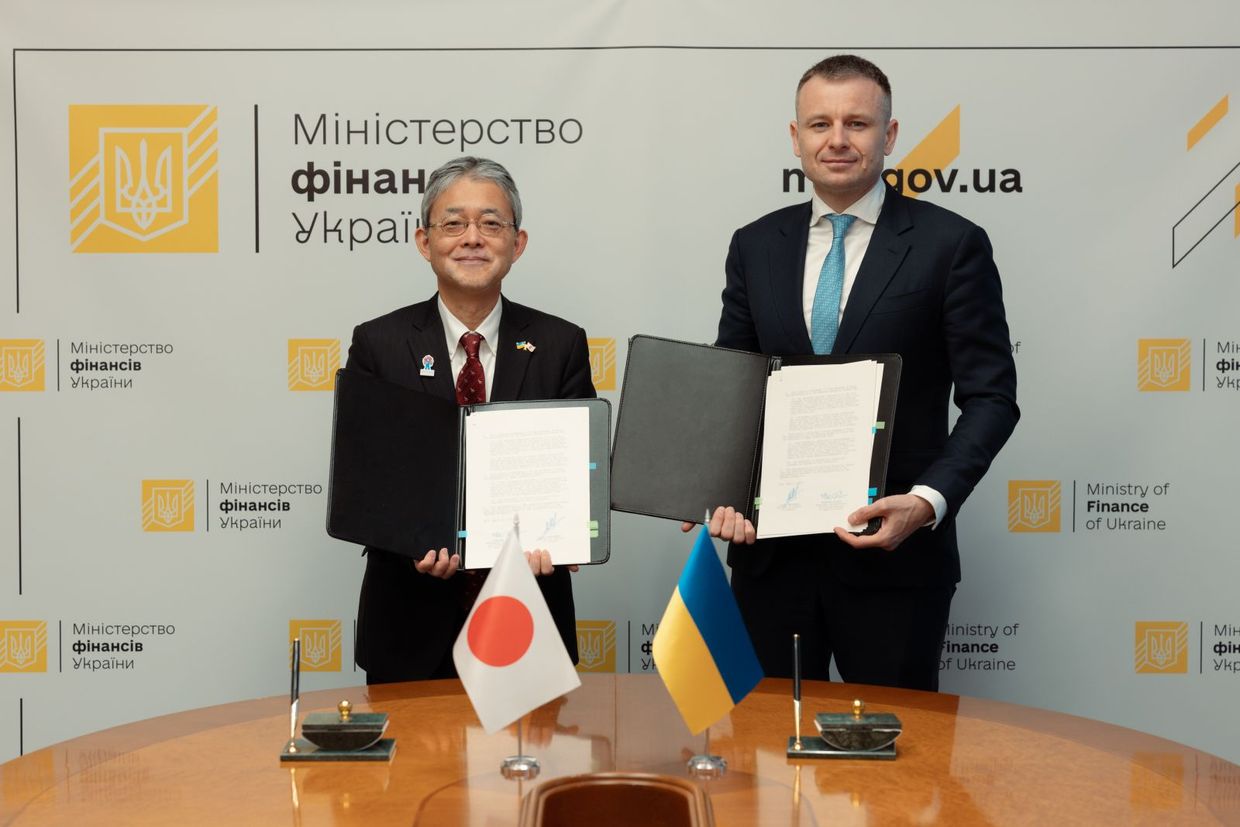
Japan’s ambassador to Kyiv, Masashi Nakagome (L), and Ukraine’s Finance Minister Serhii Marchenko sign an agreement on Japan’s loan to Ukraine as part of the G7’s Extraordinary Revenue Acceleration program, in Kyiv, Ukraine. (Finance Ministry)
“The signing of today’s Agreement will not only help meet our urgent budgetary needs, but will also be another confirmation of Japan’s sincere commitment to the common values that unite our countries.”
Japan’s funds will be disbursed over 30 years and directed toward budgetary needs and to support reconstruction and development.
The G7’s loan is mostly shouldered by the EU and the U.S., with each providing roughly $20 billion. Japan, the U.K., and Canada provide the rest of the funds.
Japan has supported Ukraine since the start of Russia’s full-scale war, transferring budget support of over $8.5 billion.
Belarusian Detained: FSB Claims Arrest of SBU Agent Planning Attack in Novorossiysk
Russia’s Federal Security Service (FSB) announced on April 18 the detention of a Belarusian citizen allegedly recruited by Ukraine’s Security Service (SBU) to gather intelligence and plan an attack against Russian forces.
In a video released by state-run RIA Novosti, the unidentified detainee, whose face was blurred, claimed to have been recruited online in December 2024 to collect information about Russia’s Black Sea Fleet and armed forces deployments in Krasnodar Krai.
The FSB alleged that the man, born in 2000, retrieved a 2.5-kilogram improvised explosive device from a hiding place under orders from a handler and was planning to bomb an administrative building in Novorossiysk.
In the heavily scripted video confession, the man claimed the attack was orchestrated by Ukrainian security services “to disrupt negotiations between the United States, Russia, and Ukraine” and escalate the conflict.
Russian authorities opened a criminal case against him on charges of preparing to commit a terrorist act. Ukraine has not commented on the claims.
Human rights groups and former detainees have consistently raised concerns about fabricated charges and forced statements from Russia’s security services, which have a documented history of extracting confessions through coercion and intimidation.
New Azov Leader: Bohdan Hrishenkov Appointed Commander of Elite Brigade
Ukraine’s legendary Azov Brigade announced the appointment of Lieutenant Colonel Bohdan Hrishenkov as its new commander on April 18, following the promotion of his predecessor, Colonel Denys Prokopenko, to head the newly formed Azov Corps.
The 31-year-old Hrishenkov, known by his call sign “Puhach,” joined Azov in 2015 and was appointed as a company commander in 2020. His personal story embodies the brigade’s resilience and sacrifices.
During the 2022 defense of Mariupol, Hrishenkov fought for 86 days under siege before being injured and eventually captured when Ukrainian commanders ordered defenders of the Azovstal steel plant to surrender. He was held at the notorious Olenivka prisoner of war camp, where he suffered multiple shrapnel wounds during a July 2022 explosion that killed over 50 Ukrainian POWs and injured more than 150.
After being returned to Ukraine in a prisoner exchange in September 2022, Hrishenkov underwent rehabilitation before returning to service. He was appointed first deputy commander of the 1st Battalion of the Azov Brigade in July 2023 and later became the battalion’s commander, leading operations near Toretsk in Donetsk Oblast.
“The new commander takes over the brigade at the moment of its greatest development. He will do everything possible for the effective work of the unit in cooperation with other brigades of the Azov Corps of the National Guard of Ukraine,” the announcement stated.
China Denies Arming Russia: Beijing Rejects Zelensky’s Claims of Weapons Supplies
China firmly denied claims by President Zelensky that Beijing is supplying weapons to Russia for use against Ukraine, with foreign ministry spokesperson Lin Jian calling the accusation “irresponsible remarks” on April 18.
“China has never made lethal weapons available to either side during this war,” Lin said during a press conference, according to Sky News.
The denial came a day after Zelensky announced that Ukrainian intelligence services had obtained information indicating that “China is supplying weapons to the Russian Federation.” The Ukrainian president said more detailed findings would be shared next week.
Zelensky’s statement followed his announcement last week that two Chinese nationals had been captured while fighting alongside Russian troops. He claimed that over 150 Chinese nationals are currently serving in the Russian Armed Forces—allegations that Beijing also rejected.
According to Ukrainian sources, the captured men claimed they joined voluntarily, denying any official involvement from Beijing. One said he was recruited while still in China, while the other claimed he joined while traveling in Russia due to financial hardship.
The dispute highlights growing international concerns about China’s role in the conflict, particularly as Western analysts observe increased cooperation between Beijing and Moscow across multiple domains.
Ukraine Hits Back: New Sanctions Target Russian Individuals and Companies
President Volodymyr Zelensky signed a decree on April 18 imposing sanctions on Russian individuals and entities, including actors, singers, athletes, and companies involved in military production, according to the Presidential Office.
The new sanctions target 39 individuals and 60 legal entities, some based in Russia and China. The measures include asset freezes, trade restrictions, bans on property acquisition, termination of licenses and permits, and transit prohibitions.
“Two important packages of sanctions will be introduced today against Kremlin propagandists and Iskander missile manufacturers,” Zelensky had announced on April 17, previewing the move.
Among those sanctioned are Ukrainian-born actor and singer Nikita Dzhigurda, Soviet-era clown Yuri Kuklachyov, and Russian actor Oskar Kuchera, all of whom publicly supported Russian aggression against Ukraine. The sanctions include the revocation of state awards, asset blocking, financial restrictions, and bans on privatization or leasing of state property.
Several Chinese companies were also included in the sanctions list, including Beijing Aviation And Aerospace Xianghui Technology Co. Ltd., Rui Jin Machinery Co. Ltd., and Zhongfu Shenying Carbon Fiber Xining Co. Ltd.
German Aid Unlocked: Bundestag Approves €3 Billion for Ukraine
Germany’s parliamentary budget committee approved an additional 3 billion euros ($3.3 billion) in military assistance for Ukraine on April 18, overcoming previous political obstacles to the funding package.
The decision represents a breakthrough for outgoing Chancellor Olaf Scholz, who had long blocked the package unless it was financed by additional borrowing. The approval follows Germany’s parliamentary vote passing a massive defense spending bill that exempts future military expenditures from constitutional deficit limits.
The package includes 2.547 billion euros from the German budget, with the remainder reimbursed by the European Peace Facility, supplementing the 4 billion euros already allocated for 2025. Germany remains Ukraine’s largest military donor in Europe, a role likely to grow as the United States signals potential reductions in its own support.
The approval comes at a critical moment for Ukraine, as it faces intensifying Russian attacks and growing uncertainty about Western commitment to its defense needs.
Journalist Attack Investigation: Interior Minister Reports on Makarov Case
Ukrainian Interior Minister Ihor Klymenko provided an update on April 18 regarding the investigation into the stabbing of prominent Ukrainian journalist and Suspilne media producer Yuriy Makarov.
The attack occurred on the evening of April 16, when an unknown assailant stabbed Makarov twice in the arm and abdomen. After the attack, Makarov called the police himself and received first aid from a patrol officer before being hospitalized.
According to Klymenko, investigators are considering multiple potential motives, including Makarov’s professional activities covering Russia’s war against Ukraine, a domestic disagreement, or the possible involvement of Russian intelligence services.
“Investigative teams and experts are now working,” Klymenko told reporters. President Zelensky separately noted that one version of events being considered is that the attack was related to Makarov’s coverage of the war.
Makarov, 69, is a well-known Ukrainian journalist, TV host, and documentary filmmaker who has worked for multiple outlets including 1+1, First National, and TVi channels. Since 2017, he served on the board of Ukraine’s public broadcaster and later became its executive producer.
Minerals Deal Details Emerge: Shmyhal to Visit Washington as Talks Progress
New details emerged on April 18 regarding the minerals agreement between the United States and Ukraine, with technical discussions set to begin in Washington on April 24 and conclude by April 26, according to Deputy Economy Minister and Trade Representative Taras Kachka.
Prime Minister Denys Shmyhal will visit Washington on April 21 to meet with U.S. Treasury Secretary Scott Bessent to support the final phase of negotiations, signaling the high-level importance both sides place on finalizing the deal.
“We are now working with our and American legal teams and are trying to remove many technical issues to narrow them down to the most sensitive ones that will require a political decision,” Kachka told Ukrinform.
The memorandum signed on April 17 outlines plans to establish a long-term economic partnership and a joint reconstruction investment fund, with Kachka emphasizing that the deal does not involve converting previously provided U.S. aid into debt. Instead, the fund is designed to generate returns for both sides.
“The United States, as one of the partners, will earn at least as much from the activities of this fund as the aid provided,” Kachka explained, adding that Ukraine would also benefit from future investment flows.
U.S. President Donald Trump told reporters on April 17 that the agreement could be signed as early as April 24, though this timeline appears to conflict with the memorandum’s projected completion schedule.
Ukrainian Wings Return: SkyUp Airlines Launches First Regular Flight Since Invasion
Ukrainian airline SkyUp Airlines made its first regular flight since the start of Russia’s full-scale invasion, flying the Chisinau-Paris route on April 18. The symbolic moment represents a small step toward normalcy for Ukraine’s aviation sector after more than three years of closed skies.
Unable to operate in Ukraine, SkyUp moved its base to Chisinau, Moldova—the closest international airport to the Ukrainian border. The company will also operate routes to 11 cities in seven countries, including France, Spain, Cyprus, Greece, Germany, Czechia, and Sweden.
“Today’s launch of regular flights from Chisinau is not just a new stage of the company’s operations. It is proof that Ukrainian professionals and the company remain part of the world’s aviation, despite everything,” SkyUp Airlines CEO Dmitry Seroukhov said in a statement.
While Ukraine’s skies remain closed for commercial flights, the country’s government has indicated it is “95%” ready to reopen, though it has maintained discussions about resuming domestic flights without sufficient air defenses would be “impractical” while the war continues.
Looking Ahead: The Narrowing Path to Peace
As Orthodox Easter approaches, the path to peace in Ukraine has never seemed more precarious. The Trump administration’s ultimatum—make progress or we walk away—creates enormous pressure on both sides, but particularly on Ukraine, which faces the greater existential threat.
Reports that US proposals would leave occupied territories under Russian control suggest Washington is willing to cross Ukrainian red lines to secure a deal. Meanwhile, Russia’s announcement of the end of the energy infrastructure ceasefire, followed immediately by new strikes, indicates Moscow senses an advantage in the shifting diplomatic landscape.
The coming days will prove critical. If the prisoner exchange proceeds on April 19 as reported, it could rebuild a modicum of trust. But with Russian missiles still falling on Ukrainian cities and US patience visibly waning, the window for a negotiated settlement that preserves Ukraine’s sovereignty may be closing faster than anyone in Kyiv is prepared to accept.
